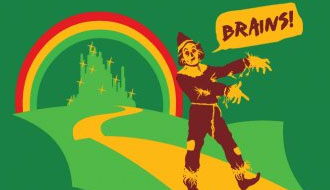At dinner last night with my screenwriter friend, I got into a discussion of the value of fan fiction, prompted by a comment I had made that indicated that I was fan of the Showtime show, The L Word, and that I read The L Word fan fiction. My friend stated that she could not fathom someone being so obsessed with a TV show as to take the characters and expand on their world and explore their lives.
“These people who are spending so much time and energy on fictitious characters and situations should spend that time and energy cultivating their real life relationships. Only people who are dissatisfied with their lives would spend that much on fan fiction, and reading about people who aren’t even real,” she argued. She was making the argument that people who read fan fiction are “nerds,” which I don’t completely disagree with. However, she was discounting the very real emotional attachment that people have to the characters and their stories, which also discounts the values of having a space in which narratives and storytelling are explored around common interests in order to form a participatory community.
So I replied, “But you, who are a screenwriter, should know better than anyone the process of getting into a fictitious character’s head in order to explore issues and stories through an emotional narrative plot line.” I was flabbergasted that she could not see how people would get emotionally attached to fictitious characters and would want to treat them like real people when, through the process of writing a screenplay, a screenwriter treats these characters like real people in order to portray them and make them feel as real as possible.
“Filmmaking is a business. People spend years and years on films so they can get paid. People spend tons of time writing fan fiction, but never get paid!” She did have a point, a broader topic, perhaps, of how art and creativity has become commodified, standardized with rules of conventions for what will sell. Her argument also touches upon ideas of gift economy and digital labor. Indeed, The L Word Fan Fiction site is completely free. People give freely of their own time to write stories, and others give of their time to comment and give feedback. I countered my friend’s argument, “What, then, do you think of people who make webisodes and short films on YouTube? The value in fan fiction seems to lie in the formation of community. The value of these communities lie perhaps not in economic capital. The Internet has enabled a platform on which people from geographically disparate areas can gather and form a community based on a common interest, with similar levels of obsession for that interest. Perhaps its value lies in the accumulation of social capital through participating in this community.”
Or something like that. I’m paraphrasing in quotations here.
There seemed to be two points here. On one hand, we were talking about real life versus fictitious life, and the time and energy invested in exploring fictitious worlds. My friend seemed to think that unless one is getting paid for their fantasy explorations, such explorations and expansions of pre-existing worlds are not legitimate uses of one’s life and one’s time, and that one must only partake in these communities because one’s real life sucks. This leads to the other point – the point about community in fan fiction, and the very real emotional investments people have in characters and their stories. Walt Fisher, through the narrative paradigm, talks about the “cognitive significance of aesthetic communication lies in its ability to manifest knowledge, truth or reality, to enrich understanding of self, other, or the world.” (Fisher, 1989, 13) Human truth or reality includes emotions and feeling. Fiction writing, being a form of aesthetic communication, ties itself to these human emotions, rendering them real through the narrative storytelling process.
In fan fiction, writers use familiar characters, popularized on television shows, as a means by which to explore deeper narrative plots and emotional entanglements, mostly for entertainment, but through a narration, and through sharing the narration, and interacting with others, a community is formed. Sometimes the community, like The L Word fan fiction community, are built around members of marginalized social groups (in this case, lesbians and queer women), giving people a space in which they can explore or affirm their identity among people who understand. Some of these people are geographically located in areas where being not heterosexual is not ok. Fan communities, then, provide them with a space filled with people who are like them and who will not stigmatize them for who they are or what they enjoy as entertainment. In a community of obsessors, no one is one.
Fan fiction and fanvidding (wherein people use actual clips from TV shows and remix and re-edit them to tell a narrative), have long been considered stigmatized. As my friend stated, it has a reputation for being the socializing grounds for people who don’t have lives offline. An L Word fan fiction writer with whom I’ve had conversations keeps her fan fiction writing from her family. Similarly, a maker of L Word fan videos with whom I have corresponded, keeps her fanvidding life behind closed doors. One is conventionally known only by one’s username on fan fiction sites. Perhaps in the case of the L Word, there is the added stigma of dealing with homosexuality in the stories, in a time and world in which being gay or lesbian, or queer, is still stigmatized, or at the very least, marginalized.
The L Word fan fiction seems to have a double-whammy effect in terms of its marginalization. First, it’s fan fiction. Second, it’s fan fiction based on a show filled primarily with members of a marginalized social group (lesbians).
When Showtime’s TV series, The L Word, first aired in 2004, it was hailed, on one hand, as a “groundbreaking” show which had a cast and plots centered around lesbians and their lives, and on the other, as a squandered opportunity, stereotypically Hollywood with their skinny portrayals of characters, that does injustice to the lesbian community as a whole. (http://www.offourbacks.org/LWordRev.htm) Shortly after the inception of the show, fan fiction communities sprung up on the Internet with stories revolving around the characters in The L Word, many addressing the unsatisfactory handlings of the canon storyline as seen on Showtime. The most popular of these is a site that is aptly named “The L Word Fan Fiction” (http://fanfiction.l-word.com/fanfiction_list.php). One of the more popular coupling on the site is Bette and Tina, a canonical couple who, in the canon storyline, had started out as a committed couple, and, after six years of twists and turns, end up back together. Many people on fan fiction sites see them as the epitome of love. Throughout the six canonical TV seasons, there are a few moments or events that happen that I call “points of trauma.” For the Bette and Tina relationship, there are about 3-5 major ones. I’ve noticed that many fan fiction stories revolve around explaining these points of trauma, expanding on the characters’ actions and thoughts, sometimes to the point of psychoanalysis, and using re-narration and re-telling of the canonical story, and taking it in different directions, as a healing process – to heal both the characters, and the writers, who, being fans with real emotional investments in these fictitious characters, experienced the trauma as well.
I will be talking about these points of trauma in more specificity in a future blog post, as well as the interconnectedness and cross-references of the stories within the fan fiction community.





